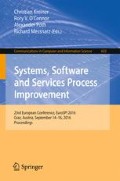Abstract
In Multi-Disciplinary Engineering (MDE) environments, engineers coming from different disciplines have to collaborate. Typically, individual engineers apply isolated tools with heterogeneous data models and strong limitations for collaboration and data exchange. Thus, projects become more error-prone and risky. Although Quality Assurance (QA) methods help to improve individual engineering artifacts, results and experiences from previous activities remain unused. This paper describes a Collective Intelligence-Based Quality Assurance (CI-Based QA) approach that combines two established QA approaches, i.e., (Software) Inspection and the Failure Mode and Effect Analysis (FMEA), supported by a Collective Intelligence System (CIS) to improve engineering artifacts and processes based on reusable experience. CIS can help to bridge the gap between inspection and FMEA by collecting and exchanging previously isolated knowledge and experience. The conceptual evaluation with industry partners showed promising results of reusing experience and improving quality assurance performance as foundation for engineering process improvement.
Access this chapter
Tax calculation will be finalised at checkout
Purchases are for personal use only
Notes
- 1.
Software tool Jira: https://www.atlassian.com/software/jira.
- 2.
Gerrit: https://www.gerritcodereview.com.
- 3.
GitHub: https://github.com.
- 4.
Linear scale for probability, severity, and detectability: 0 stands for very low probability, severity, and detectability; 10 indicates critical probability, severity, and detectability. For example, the rating 10/10/10 means that candidate defects will definitely be in the final product (high probability) with a very critical impact (high severity) and it is very hard to identify the defect early (high detectability).
- 5.
Eclipse Marketplace: https://marketplace.eclipse.org.
References
Kovalenko, O., Winkler, D., Kalinowski, M., Serral, E., Biffl, S.: Engineering process improvement in heterogeneous multi-disciplinary environments with defect causal analysis. In: Barafort, B., O’Connor, R.V., Poth, A., Messnarz, R. (eds.) EuroSPI 2014. CCIS, vol. 425, pp. 73–85. Springer, Heidelberg (2014)
Biffl, S., Lüder, A., Winkler, D.: Multi-disciplinary engineering for industrie 4.0: semantic challenges, needs, and capabilities. In: Biffl, S., Sabou, M. (eds.) Semantic Web for Intelligent Engineering Applications, Chap. 2. Springer (2016, to appear)
Biffl, S., Moser, T., Winkler, D.: Risk assessment in multi-disciplinary (Software +) engineering projects. IJSEKE 21(2), 211–236 (2011). SI on SW Risk Assessment
Aurum, A., Petersson, H., Wohlin, C.: State-of-the-art: software inspection after 25 years. J. Softw. Test. Verification Reliab. 12(3), 133–154 (2002)
Wiegers, K.: Peer Reviews in Software: A Practical Guide. Addison-Wesley, Boston (2001)
Broekman, B., Notenboom, E.: Testing Embedded Software. Addison Wesley, Boston (2002)
Myers, G.J., Sandler, C., Badgett, T.: The Art of Software Testing. Wiley, New York (2011)
Stamatis, D.H.: Failure Mode and Effect Analysis: FMEA from Theory to Execution. ASQ Quality Press, Milwaukee (2003)
Teng, S.-H., Shin-Yann, H.: Failure mode and effects analysis: an integrated approach for product design and process control. J Qual. Reliab. Mgmt. 13(5), 8–26 (1996)
Ericson, C.A.: Fault Tree Analysis Primer. CreateSpace Independent Publishing, Seattle (2011)
Kalinowski, M., Card, D.N., Travassos, G.H.: Evidence-based guidelines to defect causal analysis. IEEE Softw. 29(4), 16–18 (2012)
Musil, J., Musil, A., Weyns, D., Biffl, S.: An architecture framework for collective intelligence systems. In: 12th Working IEEE/IFIP Conference on Software Architecture (WICSA), pp. 21–30. IEEE (2015)
Musil, J., Musil, A., Biffl, S.: Introduction and challenges of environment architectures for collective intelligence systems. In: Weyns, D., et al. (eds.) E4MAS 2014 - 10 years later. LNCS, vol. 9068, pp. 76–94. Springer, Heidelberg (2015). doi:10.1007/978-3-319-23850-0_6
Laitenberger, O., DeBaud, J.-M.: An encompassing life cycle centric survey of software inspection. J. Syst. Softw. 50(1), 5–31 (2000)
Carver, J., Shull, F., Basili, V.: Can observational techniques help novices overcome the software inspection learning curve? An empirical investigation. ESE J. 11(4), 523–539 (2006)
Kollanus, S., Koskinen, J.: Survey of Software Inspection Research: 1991–2005, Working Papers WP-40, University of Jyväskylä (2007)
Travassos, G., Shull, F., Fredericks, M., Basili, V.R.: Detecting defects in object-oriented designs: using reading techniques to increase software quality. ACM SIGPLAN Not. 34(10), 47–56 (1999). ACM
Biffl, S.: Inspection Techniques to support Project and Quality Management. Vienna University of Technology, Shaker, Maastricht (2001). Habilitation
Shull, F., Rus, I., Basili, V.R.: How perspective-based reading can improve requirements inspection. IEEE Comput. 33(7), 73–79 (2002)
Winkler, D., Biffl, S.: Focused inspections to support defect detection in multi-disciplinary engineering environments. In: 16th International Conference on Product-Focused Software Process Improvement, Research Preview Paper (2015)
Blackwell, A., Green, T.: Notational Systems – The Cognitive Dimensions of Notations Framework, HCI Models, Theories, and Frameworks: Toward an Interdisciplinary Science. Morgan Kaufmann, San Francisco (2003)
Moser, T., Mordinyi, R., Winkler, D., Melik-Merkumians, M., Biffl, S.: Efficient automation systems engineering process support based on semantic integration of engineering knowledge. In: 16th International Conference on Emerging Technologies. and Factory Automation (ETFA) (2011)
Novak, P., Serral, E., Mordinyi, R., Sindelar, R.: Integrating heterogeneous engineering knowledge and tools for efficient industrial simulation model support. Adv. Eng. Inf. 29(3), 575–590 (2015)
Acknowledgements
Parts of this work were supported by the Christian Doppler Forschungsgesellschaft, the Federal Ministry of Economy, Family and Youth, the Austrian National Foundation for Research, Technology and Development, and the TU Wien Doctoral College on Cyber-Physical Production Systems.
Author information
Authors and Affiliations
Corresponding author
Editor information
Editors and Affiliations
Rights and permissions
Copyright information
© 2016 Springer International Publishing Switzerland
About this paper
Cite this paper
Winkler, D., Musil, J., Musil, A., Biffl, S. (2016). Collective Intelligence-Based Quality Assurance: Combining Inspection and Risk Assessment to Support Process Improvement in Multi-Disciplinary Engineering. In: Kreiner, C., O'Connor, R., Poth, A., Messnarz, R. (eds) Systems, Software and Services Process Improvement. EuroSPI 2016. Communications in Computer and Information Science, vol 633. Springer, Cham. https://doi.org/10.1007/978-3-319-44817-6_13
Download citation
DOI: https://doi.org/10.1007/978-3-319-44817-6_13
Published:
Publisher Name: Springer, Cham
Print ISBN: 978-3-319-44816-9
Online ISBN: 978-3-319-44817-6
eBook Packages: Computer ScienceComputer Science (R0)

